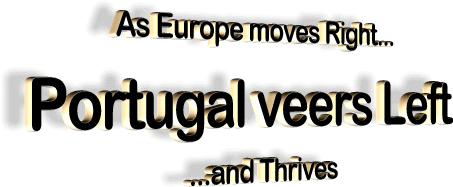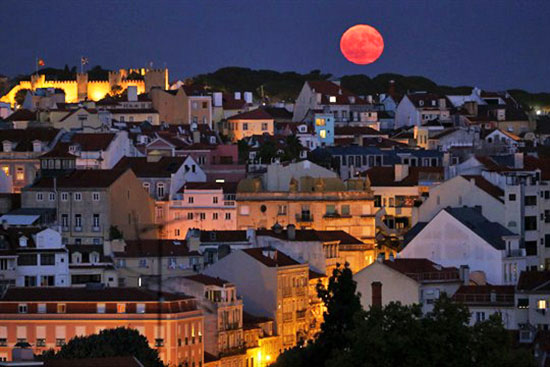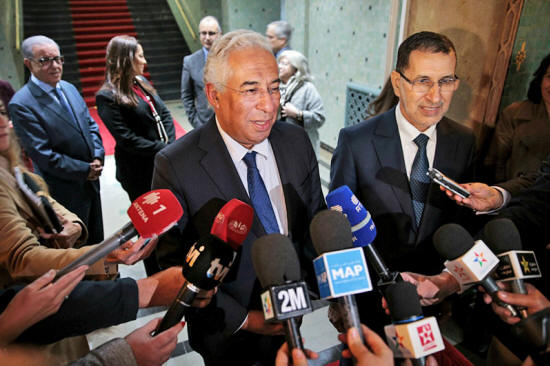|
the Castle of Saint George in Lisbon, Portugal, Sept. 6, 2017 (AP photo by Armando Franca).
European politics are in turmoil. The United Kingdom is tearing itself apart after a vote to exit the European Union.
Spain is deeply divided in the face of separatist demands from its Catalonia region. In France, the far-right National Front mounted a serious challenge for the presidency. Farther east, from Norway to Austria to Hungary, right-wing populism is resurgent.
Even in Germany, where memories of the Nazis still hold significant sway, almost 6 million Germans - 12.6 percent of those who voted - chose the anti-immigrant Alternative for Germany party in September elections.
Across the continent, the
established order of things, in place since the fall of the Berlin
Wall, no longer looks so certain or robust.
Costa formed a minority government that relies on support from the Portuguese Communist Party, or PCP, the country's third-largest political group, and Bloco de Esquerda, or BE, a small euroskeptic party on the far left.
This alliance was locally
derided as a "geringonša," Portuguese for an unstable contraption
unlikely to function, and its anti-austerity platform was viewed
with suspicion by the markets and across Europe. But against all expectations, the geringonša has not only held together but prospered.
In nationwide local elections on Oct. 1, widely seen as the first electoral test for Costa and the PS, the party won control of 159 of the country's 308 municipalities, earning 38 percent of the vote. It was the party's biggest local election victory ever.
Meanwhile, the center-right Social Democrats, or PSD, the main opposition party, suffered its worst ever defeat in local elections, winning just 16 percent of the total vote and dropping to third place in the capital, Lisbon, where it got only 11 percent.
"If the election was held again today,Costa would have a commanding majority."
The results highlight how Costa has, since assuming office, been able to strengthen his political position.
The Socialists' success, while impressive, is inextricably linked to the country's remarkable economic turnaround from the dark days of the Eurozone crisis, which hit Portugal harder than almost anywhere else.
For this reason, there is considerable debate as to whether, as a case study, Portugal offers lessons for social democratic parties elsewhere in Europe that are losing ground in the current political environment.
And there are also
signs that Portugal's domestic political challenges may soon become
more formidable, calling into question whether the strong run Costa
has enjoyed to date is sustainable.
He's slim, thoughtful and rolls a cigarette as he drinks an espresso at one of the city's outdoor kiosks.
The data backs up Sousa's impressions.
Portugal has had three years of consecutive GDP growth:
The government is winning plaudits for its economic performance outside the country, too.
In May, the European Commission reported that Portugal's budget deficit had fallen to 2 percent of GDP in 2016, well below the limit of 3 percent set out in its budget rules and the lowest since the country joined the Eurozone in 1999.
And in September, the Standard & Poor's rating agency lifted Portugal from "junk" sovereign borrower status, marking what The Financial Times referred to as "a stunning recovery" for the economy.
Portugal's prime minister, Antonio Costa, speaks to journalists after holding a meeting with his Moroccan counterpart, Saadeddine El Othmani, in Rabat, Morocco, Dec. 4, 2017 (AP photo by Mosa'ab Elshamy).
Federico Santi, Europe analyst at Eurasia Group, says the coalition has effectively taken advantage of economic tailwinds in making the case for its continued rule.
The country's high
public debt and unemployment coupled with a weak banking system
hindered its ability to cope with the global downturn. In 2011, the
Socialist government that was in power agreed to a bailout of 78
billion Euros - more than $90 billion - from the EU and the
International Monetary Fund.
Unemployment rose dramatically:
Luisa Santos is a doctor in Portugal's public health system. She also runs a guesthouse in Porto, in the north, a side gig that provides an upbeat contrast to her day job.
Over a breakfast of strong coffee and sweet cake, she comes close to tears when she recalls the bailout years.
Such bitter memories underscore the importance of complementing strong macroeconomic figures with a growing sense of national pride and hope.
According to Catherine Moury, a senior lecturer in political science at the New University of Lisbon who has studied Portugal's response to the crisis, Passos Coelho used the crisis to justify reforms he personally favored but which would have been difficult to engineer in other times.
Broadly speaking, the PSD government used the bailout years to transition the country to a more neoliberal model, deregulating the labor market, privatizing government entities such as the national airline and lowering corporate taxes.
The approach won plaudits from the IMF and EU but alienated voters, laying the groundwork for political change.
In that sense, Moury says,
The reasons behindthe Portuguese Socialists' strongshowing in recent pollsare both practical and emotional.
The PSD's embrace of more neoliberal policies contributed not just to the change in power in 2015 but also to the durability of the current alliance.
According to
Andre Freire, professor of political science at the Institute
University of Lisbon, the prospect of a second term for the PSD
government gave the far left an incentive to compromise with the
Socialists.
The result is that,
for the first time in Portugal's modern history, the left has
successfully held together an alliance.
He entered national politics in 1995, serving as a secretary of state and holding ministerial roles in previous socialist administrations before becoming mayor of Lisbon.
Between 2007 to 2015, he was elected mayor three times, earning a bigger majority with each win.
He returned to national politics to lead the PS into the 2015 election.
Freire, the author of a book about the coalition titled "Beyond the Geringonša," argues that Costa also realized that center-left parties around Europe were losing ground because of their shift to the right.
Children play soccer as the sun sets on a beach in Cascais,
near Lisbon, Portugal, (AP photo by Francisco Seco).
Young voters such as Sousa believe so.
Yet many analysts stress that the Portuguese situation is unique.
The far right has not gained a foothold here in part because the country has not experienced a recent influx of refugees or a surge in immigration, problems that are driving some voters to the right in other parts of Europe.
The Muslim community, in particular, is tiny, accounting for less than 1 percent of the population.
Portugal was for many years one of Europe's poorest countries, and the Portuguese thus have a long history of economic migration to European countries like France, Germany and Britain as well as destinations farther afield, including Brazil, the U.S. and Australia.
This may make them
more understanding of the issues immigrants face.
Even without strong
anti-European sentiments or a populist right- or left-wing
alternative, it remains to be seen whether the Portuguese government
can continue to avoid the turbulence destabilizing other European
countries.
Perversely, the country's improving economy means this balancing act is likely to become more difficult. Costa's government is already coming under increased pressure at home to further roll back austerity measures.
In recent months,
teachers and doctors have been agitating for wage increases and for
benefits that were given up during the crisis to be reinstated.
For the first timein Portugal's modern history,the left has successfullyheld together an alliance.
This is already evident.
Although the 2018 budget passed through parliament in late November with the support of the alliance partners, both Catarina Martins, the BE chairperson, and Jeronimo de Sousa, the general secretary of the PCP, have spoken out against the government in the local press.
Martins believes the government has yet to meet its commitments on labor rights and on taxation of larger corporations.
De Sousa has said that although the PCP will support the government to the end of the current legislature, it will reject a future pre-election agreement with the Socialists.
To date, Costa has had some room to move in his negotiations with his alliance partners, in part due to a growing recognition at the EU level that austerity policies and the inequalities they expose can be damaging to the European agenda.
This trust is vital to Portugal's ongoing economic success.
At 130 percent of GDP, public debt in Portugal is still the third-highest in Europe, and a rise in interest rates would have an immediate and significant impact on public finances.
But Portugal's reputation has yet to fully bounce back from the bailout years, and analysts are watching closely to see how long the economic recovery and the political alliance can hold.
It's clear that the country and the ruling left-wing alliance face challenges in 2018 and beyond.
For the moment, though, the governing "contraption" remains united, the economy is doing well, Costa is riding high in the polls and Portugal's reputation as a beacon of moderation in a Europe raven by unrest is holding up.
There are clouds on
the horizon, but in comparison to the challenges most heads of state
on the continent face, they signal not so much a storm as choppy
waters - conditions that a capable leader should be able to
navigate.
|




